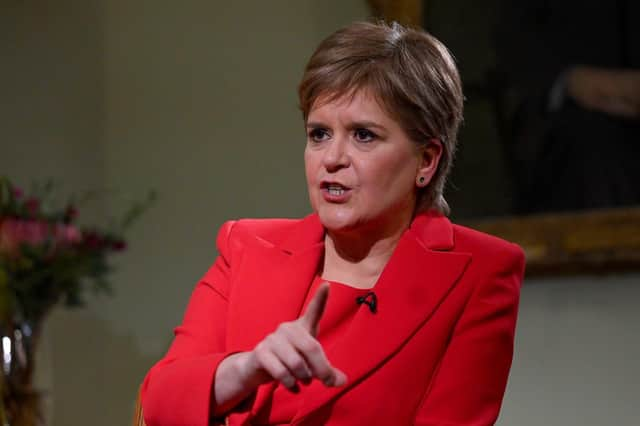Owen Polley: Government's gender recognition challenge to SNP is welcome, but highlights some inconsistencies


The secretary of state for Scotland, Alister Jack, used Section 35 of the Scotland Act 1998, which devolved powers to Holyrood, to block the SNP’s reforms.
This was an important decision for a variety of reasons, some of them constitutional and some of them related to the way that identity politics is reshaping our society.
Advertisement
Hide AdAdvertisement
Hide AdFirstly, it reminded people that, although the UK has three devolved legislatures, it is, in theory at least, a single, unitary state. The powers that the regional institutions wield are borrowed from Westminster, and if they use them in a way that clashes with national or ‘reserved’ laws then parliament has the right to assert its dominance.
In the early days of devolution, you frequently heard the phrase “power devolved is power retained”. This was a way of saying that the UK government was ultimately in charge and that it was entitled to override the administrations in Northern Ireland, Scotland and Wales, if necessary.
The Scotland Act included section 35, so that it could be used in exactly the kind of extreme circumstances that have now been created by Sturgeon and the SNP. The separatists’ gender recognition law was intended to be divisive and provoke a confrontation with the government. It was also out of step with Scottish opinion.
This bill combined Sturgeon’s desire to make Scotland appear more “progressive” than England with the SNP’s strategy of adding minority, “‘identity” based groups to its coalition of supporters. In this case, the transgender or “trans” lobby.
Advertisement
Hide AdAdvertisement
Hide AdOriginally, these campaigners wanted to encourage acceptance for a small number of “intersex” infants, born with both male and female characteristics, and people with a condition called “gender dysphoria”, that made them feel later in life that they were living in the wrong body. Now, it is associated with an aggressive and highly politicised campaign that claims gender is a matter of personal choice rather than an outcome of biology.
The SNP’s legislation pandered to this extreme view, attempting to allow anyone in Scotland, including 16-17 year olds, to change their gender without a medical diagnosis.
The government’s objections were reasonable and they’re backed by some of the UK’s foremost legal experts. The fact that they provoked such a hysterical reaction showed how this debate has become so loaded with identity ideology that people struggle to discuss it rationally. It also demonstrated how the SNP exploited the issue to create another grievance against Westminster in Scotland.
The UK-wide Equality Act, and other national laws, balance the rights of trans people carefully with the rights of women.
Advertisement
Hide AdAdvertisement
Hide AdIn contrast, the government claimed the SNP’s bill would make it difficult for grassroots women’s sports clubs to exclude biological men. It said that single-sex schools, including those in England, could be obliged to accept pupils who were born into a different gender. And it raised the possibility that there could be bureaucratic chaos if someone’s legal sex changed every time they entered or left Scotland.
Aside from these issues, cited to justify Section 35, there were enormous concerns that the bill could allow biological men to access women-only spaces, like changing rooms or hospital wards. Effectively, it meant anyone claiming to be a woman would be treated that way in the eyes of the law, opening the way for predators to abuse the system.
In addition, critics said that people who are legally minors, ie those under 18, are not equipped to make potentially life-changing decisions, including taking drugs that change their bodies or having irreversible surgery, at such a young age. They point to scandals involving the Tavistock Clinic in London, and a similar “gender identity service” near Glasgow, where troubled youngsters were allegedly encouraged to “transition” into a different sex.
The notion that these problems should be dismissed casually shows the way that so-called “progressives” try to limit important debates, by throwing around accusations of bigotry or phobia.
Advertisement
Hide AdAdvertisement
Hide AdAs for the constitutional implications, Westminster politicians should be more willing to challenge separatism, assert the primacy of UK-wide politics and show that national government delivers more for the regions than devolved administrations.
The behaviour of Rishi Sunak and his cabinet, though, throws up some contradictions.
The government challenged this Scottish bill, but it is also planning its own legislation to ban “conversion therapy” for LGBT people. Not an unworthy aim, but even the equalities minister, Kemi Badenoch, is worried that the new law, as it is drafted, could criminalise parents, doctors and counsellors who question whether children should change gender medically or suggest that their problems could be rooted in other causes.
Just as importantly, ministers seem more willing to confront the SNP and separatists in Scotland than nationalists in Northern Ireland. It is good to affirm that the UK is a unitary state, but, in contrast, just weeks ago the government’s lawyers argued that in matters of trade it is “no longer a unitary state”, when they tried to defeat a Supreme Court challenge to the NI Protocol.
Advertisement
Hide AdAdvertisement
Hide AdThe Irish Sea border is the most prominent example of decision-makers at Westminster refusing to assert their sovereignty over this part of their national territory. You could be forgiven for thinking that, to this government, some parts of the “precious Union” are more important than others.